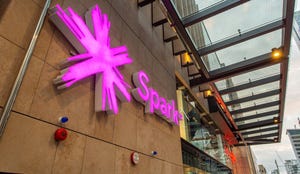VCs Still Hungry for Wireless
As long as it's absolutely guaranteed to make money, VCs still want to hear your wireless idea
August 9, 2002

Despite their reputation as vultures, venture capitalists actually prefer live prey, so do they think there's still life in wireless startups?
The nasty taste left by dotcoms and the telecom implosion -- and pressure from investors to see a return on what's left of their money -- has not stopped VCs wanting a piece of the wireless industry. Rutberg & Co. of San Francisco, itself a startup investment boutique, has found that wireless startups now command a bigger slice of the investment pie than they did during the boom times. Wireless startups represented 15 percent of North American, European, and Israeli venture funding in the second quarter of 2002, or a total of $561 million, well up on the 9 percent they held in the same quarter last year (although $652 million was put into private wireless operations). Taken over the last four quarters, wireless venture funding has been steady at between 13 percent and 18 percent of the total.
The average size of VC handouts has certainly shrunk. In the second quarter of 2001 in the U.S. it was $10.6 million; in this year's second quarter, just $7.8 million. The contraction in Europe was smaller, in the 9 percent range, to around $3.8 million.
The same positive pattern has been seen by others. Keith Arundale, the Venture Capital Sector Leader (EMEA) at PricewaterhouseCoopers in London, which surveys the European VC market, believes that "the odds of raising venture capital for technology investments are stacked in favor of well researched, innovative propositions with some seed finance already in place."
Rajeev Chand, a senior equity analyst in the wireless division of Rutberg & Co. says that what investors see in wireless is "intuitive potential." They believe that information technology will go mobile, and Chand argues that the segment is "not hyped, that it has normalized."
VCs are -- surprise, surprise -- reluctant to announce just exactly what they are willing to pay for a chunk of attractive startup or at what terms. There is no plain vanilla pricing. However, all of the VCs seemed to feel that valuations are going their way. In the opinion of Martin McNair, a director at Advent Ventures in London, "It's a good time to get in." That sentiment is echoed by Bill Wiberg, a general partner at Orange Ventures, which is owned by the mobile operator and has recently opened a research center in Boston, Mass.
Wiberg says the typical range of investment for Orange in the U.S. is in the range of $3 million to $10 million. In the case of an early-stage investment they would expect a "significant equity interest," which he said was less than a controlling 28.5 percent share. One of the six companies in the portfolio at Orange Ventures is Bytemobile Inc., which came in at number 13 in Unstrung's Top 25 Startups list.
Bytemobile's experience is not entirely typical of the sort of sums that most startups can command. Its list of investors includes some wireless venture aristocracy, including Technology Venture Partners LP, which is backed by Craig McCaw, and Ericsson Venture Partners; and its series B financing, at the end of 2001, commanded a whopping $29 million. Its series A funding, in July 2000, raised another $15 million.
It should also be considered that the figures are not the whole story. The terms for the companies can be tough, with a number of VCs trying to cover their butts in the case of liquidation. Some have insisted on clauses that give them two-, or even three-times, their money back before any other investors see theirs. However, Rutberg's Chand points out that, "though the bar is higher than two years ago, once you are over it, there are funds with money to invest."
Anders Bjoerkmann, the president of Argnor Wireless Ventures -- a VC backed by Argo Global Capital Inc. and Northstream AB, which focuses on wireless in Scandinavia -- says they expect to make three or four more investments this year. Again, he's not keen to pin himself down to numbers that could get inconvenient at some later date, but Argnor has just closed a second round of investment into the curiously named Hotsip AB, one of its existing portfolio companies.
Hotsip raised a total of €4.5 million from Argnor, 3i Group plc, and Ledstiernan. The first round, in January 2001 (following a small seed round in 1999) raised €10.5 million. A spokesman for Hotsip says the new round helped the company clinch two big OEM deals that they might otherwise have struggled to land. In the current rocky market, customers prefer to use solid suppliers, which means those with money in the bank.
Even if present valuations are a breath of fresh air to the VCs after the feeding frenzy of 2000/2001, the VCs are not making cheap bulk buys. They say they are concentrating on companies with some proof of concept, preferably those with revenues, and are in a position to be "very choosy," according to McNair. As the Hotsip deal suggests, they are also focused on the wellbeing of existing investments. The days of handing over the cow for a handful of beans [Ed. note: Jack and the RF stack?] are well and truly gone.
But where are the VCs actually putting their money? None of them wants to flag up an opportunity to the competition, so they aren't naming names.
However, Bjoerkmann would like to see a "smart way" of enabling business services to be operator agnostic. What they basically want is "anything that would increase the efficiency of the operator and have a clear operator ROI." This feeds into an interest in OSS, which was also strong at Orange Ventures. Wiberg would like to see "event and transaction-based billing." He's probably not alone there.
McNair believes that "shorter-range WLAN applications are undoubtedly hot at the moment." Wireless is, he says, seen as fundamental to extending the presence of desk-tops in the home, to making them hubs for home entertainment and communication. He is more leery of public WLAN, as are Wiberg and Bjoerkmann.
This focus on WLAN is backed up by the Rutberg figures. The biggest wireless investment category in this year's second quarter was 802.11-related deals. Envara raised $16 million; Magis Networks Inc. pocketed $40 million; Resonext Communications Inc. , $14 million. In Europe, the biggest single deal was worth $25 million, for the tower developer Alan Dick & Co. In second position was Symbian Ltd., out of the OSS stable, at $21 million.
Rutberg & Co. analysts expect WLAN to be a "multibillion-dollar opportunity," though there are some worries now about too many investors piling into the sector. The next two segments to have VCs reaching for their wallets are wireless semiconductors -- already the second largest -- and devices.
But wireless is not just cute little toys. McNair points to less glamorous issues such as network planning and power management. He says that a mobile operator can spend €200 million a year on providing electricity to its base stations -- a figure most operators would, presumably, be more than happy to seek shrink. Equally, reducing the size of antennae would make finding sites for them an easier task -- not a very compelling mass-market proposition, but one that could well lead to "healthy multiples on quite small investments," which, of course, VCs like.
As all this suggests, business reality rules. Even the major wireless vendors, which have traditionally kept a corner open for boffins to twiddle around with blue-sky research, are cutting costs to the bone.
VCs say they see this as an opportunity to set up small design houses. Support for management buyouts is increasing, and startups can set up shop as designers to the new contract manufacturers.
So, the message is: If you have a sure-fire idea that will increase ARPUs, cut costs, improve efficiency, and launch the wireless equivalent of Coca-Cola (preferably with the addictive element still there), investors would like to hear from you. [Ed. note: So it's not like they want the moon or anything then.]
— Ouida Taaffe, special to Unstrung
http://www.unstrung.com
You May Also Like










